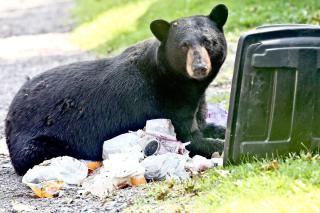BE BEAR AWARE!

The official start to spring means that bears are emerging from their slumber and beginning the search for food.
Today, bears share space with a rapidly growing human population. Black bears are curious, intelligent, and very resourceful; they will explore all possible food sources. If they find food near homes, campgrounds, vehicles, or communities, they’ll come back for more. Bears will work hard to get the calories they need, and can easily damage property, vehicles, and homes. Bears that become aggressive in their pursuit of an easy meal must often be destroyed. Every time we’re forced to destroy a bear, it’s not just the bear that loses. We all lose a little piece of the wildness that makes Colorado so special.
So please, learn to protect bears by being "Bear Aware", and share this information with your friends, neighbors, and community. We’re here to help!
Residents and visitors to bear country statewide need to do their part to help conserve our wildlife by working to reduce the chances of human-bear interactions.
- Seeing a bear in its natural habitat is a special treat. While it is an exciting moment, it is important to remember that bears are wild and can be unpredictable. Always check with the nearest visitor center or backcountry office for the latest bear safety information and do your part to keep bears wild.
- If you spot a bear, remember you are a visitor in their home and respect their space. Keep bears wild by observing them in their natural element from afar and, remember, if you see a stray cub, its mother is close by.
- Know Before You Go: In bear country, store food and other attractants in a bear-resistant container at all times and dispose of trash in bear-resistant dumpsters. Doing your part to keep bears wild can help ensure their vitality for years to come.
- Be Bear Aware While Camping: To avoid unwanted visitors and keep bears wild, stash your trash, store attractants in locked vehicles, bear canisters or provided lockers, keep a clean camp and tent, and lock RVs and vehicles.
Tips to prevent human/bear conflicts include:
- Keep garbage in a well-secured enclosure and only put out garbage on the morning of pickup; bring in empty cans back inside before dark.
- Use a bear-resistant trash can or dumpster. These are available online or from your trash hauler.
- Clean all garbage cans regularly to keep them odor free. The scent of ammonia can deter bears.
- Take down all bird feeders by April 15 – bird feeders are a major source of bear/human conflicts. Birds don't need to be fed during the spring and summer. Hang feeders again in mid-November.
- Don't leave pet food or stock feed outside – never provide food sources for any wildlife.
- Keep garage doors and windows closed and locked, especially between dusk and dawn.
- Don’t leave attractants such as snacks, food wrappers, gum, or even scented hand lotions in your car; and always lock vehicle doors.
- Use bear boxes or bear-proof containers for food and scented items when camping.
- Don't leave food outside while camping. If bear boxes aren't available local all food in a vehicle.
- Review CPW’s Bearproofing Your Home Fact Sheet and conduct a home audit to be sure you are not attracting bears to your property.
- Talk to your neighbors and kids about being bear aware.
For more information about Living with Bears in Colorado, visit https://cpw.state.co.us/bears.

